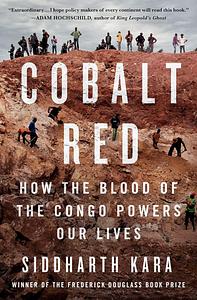Take a photo of a barcode or cover
challenging
emotional
informative
sad
medium-paced
challenging
dark
slow-paced
challenging
dark
emotional
informative
sad
medium-paced
dark
emotional
informative
reflective
sad
slow-paced
Stop buying the latest tech just for the sake of owning something new.
Free the Congo now.
Free the Congo now.
dark
informative
medium-paced
Critically important read for understanding an underdiscussed issue. The topics addressed here affect all of us, yet remain invisible to those in the first world. Somehow keeps getting more horrifying the further you read.
dark
emotional
informative
reflective
sad
medium-paced
a harrowing, saddening but incredibly important read. not only do we need to continue spreading awareness about what is happening in the congo, but we need to demand justice for the congolese people. the book details the terrifying truth of the search for cobalt. although not perfect journalism by any means, especially the way the author represents solutions to the numerous problems. like, i’m sorry, but what kind of solution to end child slavery and slave labour in the congo is “treat the workers better?! these are damn children and teens and men and women! but it is still an essential read nonetheless.
Graphic: Child death, Death, Racism, Slavery, Violence, Police brutality, Murder
Moderate: Sexual violence, Sexual harassment
dark
emotional
informative
reflective
sad
slow-paced
While a harrowing account of the horrible conditions of cobalt mining in the Congo, this book is awfully one-dimensional. It’s crucial to hear firsthand from people directly involved in ludicrously unregulated and dangerous mining practices, but this book focuses so much on the death and destruction that it borders on trauma porn. It also provides incredibly little in terms of the political landscape—both politicians and policy itself—within which this kind of activity exists. There was the only barest of passing comments about advocacy work or journalism being done by Congolese people for Congolese people, which rings a bit of white saviorism (despite the author being Indian).
I also resent the excessively “poetic” and frankly disrespectful portrayal of Congolese people—the author’s descriptions project both his own feelings as well as age-old stereotypes of Africans. I understand that many Congolese people experience unknowable suffering, but Kara simply reduces everyone in his narrative to victims with zero agency or joy, which contributed to the trauma porn quality of this book.
Overall, it’s somewhat informative and has important primary sources, but I’d certainly not recommend this book.
I also resent the excessively “poetic” and frankly disrespectful portrayal of Congolese people—the author’s descriptions project both his own feelings as well as age-old stereotypes of Africans. I understand that many Congolese people experience unknowable suffering, but Kara simply reduces everyone in his narrative to victims with zero agency or joy, which contributed to the trauma porn quality of this book.
Overall, it’s somewhat informative and has important primary sources, but I’d certainly not recommend this book.
"Please let everyone in your country know that a child in the Congo dies every day so that they can charge their phones."
Anyone with a smartphone, laptop, tablet, or electric vehicle should read "Cobalt Red." This book provides a crucial and enlightening investigation into the human toll associated with the technology we utilize every day, conveyed through the experiences of the Congolese individuals who live, labor, and endure hardships in the cobalt mines of the Democratic Republic of the Congo.
Author and researcher Siddharth Kara ventured into the cobalt mining areas to gather firsthand testimonies from the men, women, and children who are at the lowest tier of the global tech supply chain. These individuals labor under dangerous and inhumane conditions, lacking safety measures, healthcare, or education as they search for the mineral that powers our rechargeable devices. Kara’s investigation is relentless, grounded in facts, and deeply impactful.
This book does not seek to evoke feelings of guilt. Kara presents the facts plainly, supporting them with credible data. He points out companies like Apple, Google, Samsung, Dell, and GM that have supply chains associated with child labor and exploitative sourcing practices. These corporations frequently obscure their involvement through layers of contractors and plausible deniability.
The book is rich with information, covering the history of the Congo, the legacy of colonial exploitation, systemic corruption, and the increasing global demand for cobalt. Yet, it remains grounded in the human stories that make it unforgettable. It challenges the illusion of "clean tech" and confronts readers with a harsh truth: the cost of our convenience is paid in blood.
Reading this book was a profound experience for me. After finishing it, I felt as though my worldview had shifted significantly. I firmly believe that "there is no such thing as ethical consumption under capitalism." The stories within, particularly those about child labor, tunnel collapses, and the miners' lack of choices, will stay with me for the rest of my life.
Last year, I read Adam Hochschild's "King Leopold's Ghost," which quickly became one of my favorite books of 2024. Based on my appreciation for that book, many people recommended that I read "Cobalt Red." While it is heartbreaking, this book is essential reading, and I easily rate it 5 stars.
Anyone with a smartphone, laptop, tablet, or electric vehicle should read "Cobalt Red." This book provides a crucial and enlightening investigation into the human toll associated with the technology we utilize every day, conveyed through the experiences of the Congolese individuals who live, labor, and endure hardships in the cobalt mines of the Democratic Republic of the Congo.
Author and researcher Siddharth Kara ventured into the cobalt mining areas to gather firsthand testimonies from the men, women, and children who are at the lowest tier of the global tech supply chain. These individuals labor under dangerous and inhumane conditions, lacking safety measures, healthcare, or education as they search for the mineral that powers our rechargeable devices. Kara’s investigation is relentless, grounded in facts, and deeply impactful.
This book does not seek to evoke feelings of guilt. Kara presents the facts plainly, supporting them with credible data. He points out companies like Apple, Google, Samsung, Dell, and GM that have supply chains associated with child labor and exploitative sourcing practices. These corporations frequently obscure their involvement through layers of contractors and plausible deniability.
The book is rich with information, covering the history of the Congo, the legacy of colonial exploitation, systemic corruption, and the increasing global demand for cobalt. Yet, it remains grounded in the human stories that make it unforgettable. It challenges the illusion of "clean tech" and confronts readers with a harsh truth: the cost of our convenience is paid in blood.
Reading this book was a profound experience for me. After finishing it, I felt as though my worldview had shifted significantly. I firmly believe that "there is no such thing as ethical consumption under capitalism." The stories within, particularly those about child labor, tunnel collapses, and the miners' lack of choices, will stay with me for the rest of my life.
Last year, I read Adam Hochschild's "King Leopold's Ghost," which quickly became one of my favorite books of 2024. Based on my appreciation for that book, many people recommended that I read "Cobalt Red." While it is heartbreaking, this book is essential reading, and I easily rate it 5 stars.
challenging
dark
informative
sad
tense
medium-paced
This is a must read to understand the exploitation and abusive if the Congo at the hands of Europeans and other western governments. Tragic and crucial to understand the reality to make conscious choices of what we support, what we buy etc. The audio book had a podcast feel which made it so it didn’t drag at all. Im sorry this book has to exist but grateful for the opportunity to learn.
The content of this journalism is extremely important to be known about -- I just don't think this book was the best way to spread that. It feels like a collection of articles or on the ground notes from Kara, not a book. The best moments of this book are the interviews and the descriptions. Humanity always shines through. But as a book, I feel there needs to be more well researched, more in depth analysis on the issue, looking more at the Chinese government's stance on cobalt mining and talking to other journalists and compiling their research -- maybe giving more of a historical analysis on where the future of cobalt mining could go. As this book is, it can get repetitive and really confusing at some points when all of these mining companies are brought up without great explanations of how they all fit. And this is not poverty porn. It is reality.





